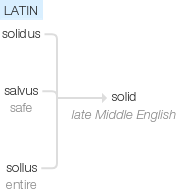Solid
late Middle English: from Latin solidus ; related to salvus ‘safe’ and sollus ‘entire’.
wiktionary
From Middle English solide, borrowed from Old French solide (as an adjective), from Latin solidus(“solid”), from Proto-Indo-European*solh₂-i-dʰ-o-s(“entire”), suffixed form of root *solh₂-(“integrate, whole”). Doublet of sol, sold, soldo, solidus, and sou.
etymonline
solid (adj.)
late 14c., "not empty or hollow," from Old French solide "firm, dense, compact," from Latin solidus "firm, whole, undivided, entire," figuratively "sound, trustworthy, genuine," from PIE *sol-ido-, suffixed form of root *sol- "whole."
Meaning "firm, hard, compact" is from 1530s. Meaning "entirely of the same stuff" is from 1710. Of qualities, "well-established, considerable" c. 1600. As a mere intensifier, 1830. Slang sense of "wonderful, remarkable" first attested 1920 among jazz musicians. As an adverb, "solidly, completely," 1650s. Solid South in U.S. political history is attested from 1858. Solid state as a term in physics is recorded from 1953; meaning "employing printed circuits and solid transistors" (as opposed to wires and vacuum tubes) is from 1959. Related: Solidly.
solid (n.)
late 14c., "three-dimensional figure," from solid (adj.). Meaning "a solid substance" is from 1690s. Compare also solidus; Latin solidus (adj.) was used as a noun meaning "an entire sum; a solid body."
